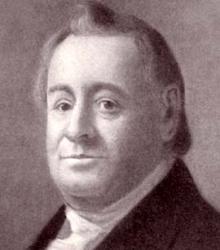- Home
- Archival Material
- College History Projects
- Subject-Based Digital Projects
Samuel Brown (1769-1830)

Samuel Brown was born January 30th, 1769 to Rev. John and Margaret Preston Brown in modern-day Rockbridge County, Virginia. Educated in his father's grammar school, Samuel also studied at Rev. James Waddell’s seminary before entering Dickinson College in Carlisle, Pennsylvania in 1787. He was elected to the Belles Lettres literary society, and received his BA in 1789. Preparing for the medical profession, Samuel studied with his brother-in-law Alexander Humphreys in Staunton, Virginia and Benjamin Rush in Philadelphia. In 1792, Samuel went to the Universities of Edinburgh and Aberdeen in Scotland, receiving his medical degree from Aberdeen in 1794.
During his career as a physician, Samuel established himself in Bladensburg (Maryland), Lexington (Kentucky), and New Orleans. From 1799 to 1806 he taught chemistry, anatomy and surgery at Transylvania University in Lexington. In 1800, Samuel joined the American Philosophical Society. He is responsible for bringing the smallpox vaccine to Lexington, inoculating more than 500 people by 1802. In 1819, he abandoned plans for an Ohio medical school in favor of the chair of theory and practice of medicine at Transylvania University. He retired in 1825. Among his other accomplishments, Samuel founded the Kappa Lambda Society of Hippocrates, invented a ginseng clarification process, and promoted the practice of lithotrity, a non-invasive method of breaking up bladder stones.
In 1808 or 1809, Samuel married Catherine Percy of Natchez, Mississippi. Catherine died in 1813 and Samuel suffered strokes in 1826 and 1829, the second leading to his death on January 12, 1830 at the age of sixty-two. Samuel was survived by his two children, Susan Catherine (b. c.1809) and James Percy (b. 1810 or 1812).
Date of Post:
2005
College Relationship:
Alumnus/Alumna Class Year: